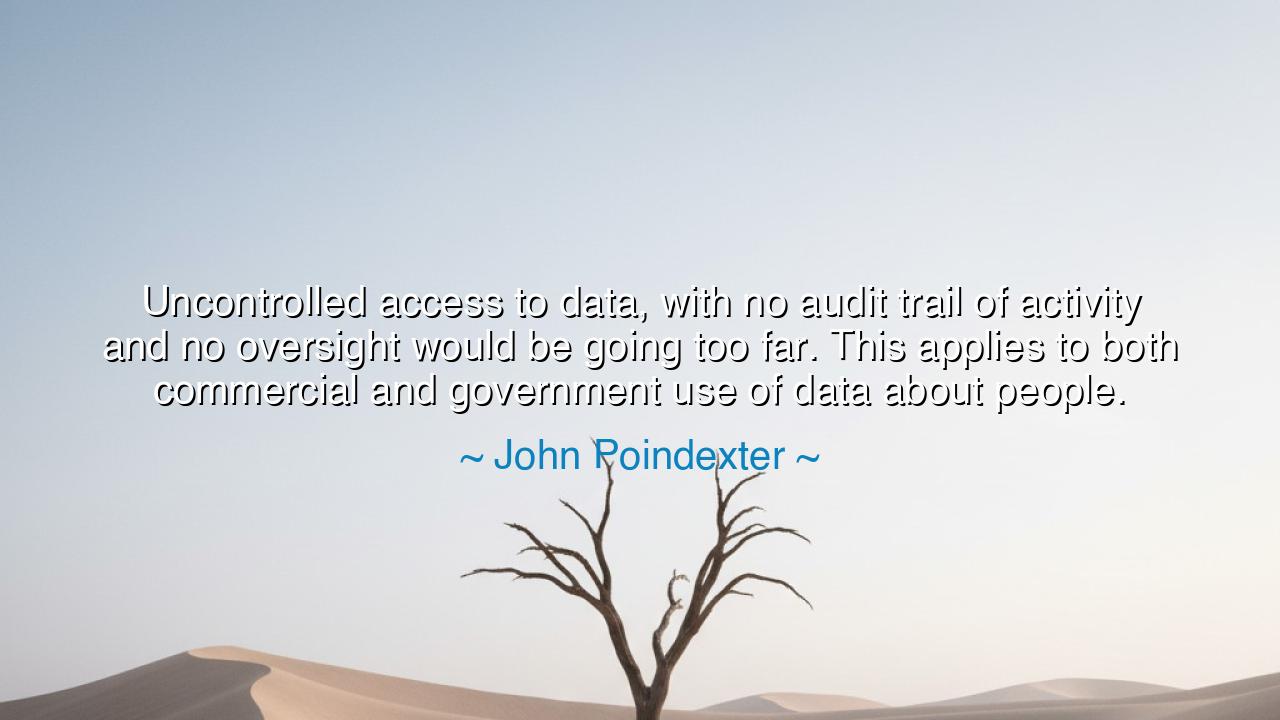
Uncontrolled access to data, with no audit trail of activity and
Uncontrolled access to data, with no audit trail of activity and no oversight would be going too far. This applies to both commercial and government use of data about people.






In the quiet dawn of the digital age, a voice of warning rose from among the architects of power—John Poindexter, a man who knew well the shadowed corridors where information and authority entwine. He spoke with clarity and caution: “Uncontrolled access to data, with no audit trail of activity and no oversight, would be going too far. This applies to both commercial and government use of data about people.” These words are not mere counsel for the present—they are prophecy for the ages. For as fire, once freed, consumes all in its path, so too does unguarded information become a devouring flame when left without conscience or control.
In ancient times, power was measured in armies, gold, or land. But in our age, it is measured in data—in the quiet, unseen currents of knowledge that flow through every heart, every home, every hidden corner of the world. To know the movements, the desires, the secrets of a people is to hold dominion over them. And thus, Poindexter’s warning is not one of technology, but of human nature itself. He speaks of the eternal truth that power, once unobserved, will always seek to grow beyond its rightful bounds. The danger lies not in the tools, but in the hands that wield them.
History tells us what happens when oversight fades and secrecy becomes sovereign. Recall the tale of East Germany, where the Stasi, in the name of security, built an empire of surveillance so vast that even the whispers of friends became weapons. Millions lived under invisible chains, bound by fear of being known too well. Every letter, every call, every neighbor’s glance became a thread in a web of control. They gathered data without restraint, but with it came not safety, only suffocation. When truth is replaced by watchfulness, freedom dies silently, strangled by its own shadow.
Yet, Poindexter’s wisdom reaches beyond governments. For in our own age, the commercial powers—the merchants of data—have become unseen kings. They gather more than gold: our habits, our thoughts, our desires. They shape what we see, what we believe, and even who we become. Their uncontrolled access to data, too, walks the edge of tyranny, though cloaked in convenience. And when both commerce and government feed upon the same stream of knowledge, the danger multiplies, for who then remains to guard the guardians?
The call for an audit trail is not mere bureaucracy—it is the chain of memory, the written conscience of power. Without it, there is no record of truth, no way to hold the mighty to account. Oversight is the soul of justice, the mirror that reflects power’s actions back upon itself. In every realm—whether throne, temple, or algorithm—those who act unseen grow bold, and those who are not watched soon forget whom they serve. To demand oversight, then, is not to distrust authority; it is to preserve its honor.
Let us look to a brighter example: the creation of checks and balances in the founding of free nations. The framers of the American Constitution, wise in the ways of human ambition, did not trust even themselves without oversight. They built a system where every act of power could be traced, questioned, and recorded. They understood that freedom without transparency is illusion, and authority without accountability is tyranny in waiting. So too must our modern empires of data learn this ancient truth: that only those who can be watched are worthy to be trusted.
The lesson is clear and grave: in the age of information, the greatest defense of liberty is vigilance—not only of citizens watching governments, but of people watching the machines that watch them. Each of us must guard our digital selves as our ancestors once guarded their homes and lands. Question what is taken, demand to know how it is used, and insist upon oversight wherever power grows unseen. For if knowledge is power, then transparency is its moral compass.
Therefore, my child of the future, walk wisely in this world of glass and code. Do not reject the tools of progress, but wield them with reverence and restraint. Remember always that data, like fire, gives warmth and light only when contained. Beyond its bounds, it burns and devours. And so, let Poindexter’s words echo within you as an eternal commandment: Guard your information as you guard your freedom. For the government serves the people, and the data must serve humanity—not rule it.






AAdministratorAdministrator
Welcome, honored guests. Please leave a comment, we will respond soon